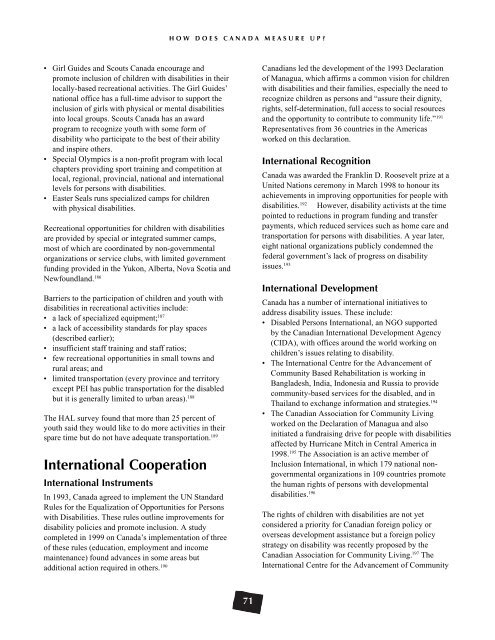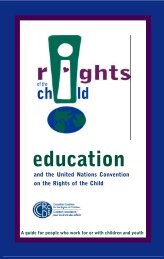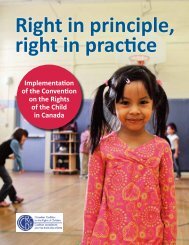Poste - Canadian Coalition for the Rights of Children
Poste - Canadian Coalition for the Rights of Children
Poste - Canadian Coalition for the Rights of Children
Create successful ePaper yourself
Turn your PDF publications into a flip-book with our unique Google optimized e-Paper software.
• Girl Guides and Scouts Canada encourage and<br />
promote inclusion <strong>of</strong> children with disabilities in <strong>the</strong>ir<br />
locally-based recreational activities. The Girl Guides’<br />
national <strong>of</strong>fice has a full-time advisor to support <strong>the</strong><br />
inclusion <strong>of</strong> girls with physical or mental disabilities<br />
into local groups. Scouts Canada has an award<br />
program to recognize youth with some <strong>for</strong>m <strong>of</strong><br />
disability who participate to <strong>the</strong> best <strong>of</strong> <strong>the</strong>ir ability<br />
and inspire o<strong>the</strong>rs.<br />
• Special Olympics is a non-pr<strong>of</strong>it program with local<br />
chapters providing sport training and competition at<br />
local, regional, provincial, national and international<br />
levels <strong>for</strong> persons with disabilities.<br />
• Easter Seals runs specialized camps <strong>for</strong> children<br />
with physical disabilities.<br />
Recreational opportunities <strong>for</strong> children with disabilities<br />
are provided by special or integrated summer camps,<br />
most <strong>of</strong> which are coordinated by non-governmental<br />
organizations or service clubs, with limited government<br />
funding provided in <strong>the</strong> Yukon, Alberta, Nova Scotia and<br />
Newfoundland. 186<br />
Barriers to <strong>the</strong> participation <strong>of</strong> children and youth with<br />
disabilities in recreational activities include:<br />
• a lack <strong>of</strong> specialized equipment; 187<br />
• a lack <strong>of</strong> accessibility standards <strong>for</strong> play spaces<br />
(described earlier);<br />
• insufficient staff training and staff ratios;<br />
• few recreational opportunities in small towns and<br />
rural areas; and<br />
• limited transportation (every province and territory<br />
except PEI has public transportation <strong>for</strong> <strong>the</strong> disabled<br />
but it is generally limited to urban areas). 188<br />
The HAL survey found that more than 25 percent <strong>of</strong><br />
youth said <strong>the</strong>y would like to do more activities in <strong>the</strong>ir<br />
spare time but do not have adequate transportation. 189<br />
International Cooperation<br />
International Instruments<br />
In 1993, Canada agreed to implement <strong>the</strong> UN Standard<br />
Rules <strong>for</strong> <strong>the</strong> Equalization <strong>of</strong> Opportunities <strong>for</strong> Persons<br />
with Disabilities. These rules outline improvements <strong>for</strong><br />
disability policies and promote inclusion. A study<br />
completed in 1999 on Canada’s implementation <strong>of</strong> three<br />
<strong>of</strong> <strong>the</strong>se rules (education, employment and income<br />
maintenance) found advances in some areas but<br />
additional action required in o<strong>the</strong>rs. 190<br />
H O W D O E S C A N A D A M E A S U R E U P ?<br />
71<br />
<strong>Canadian</strong>s led <strong>the</strong> development <strong>of</strong> <strong>the</strong> 1993 Declaration<br />
<strong>of</strong> Managua, which affirms a common vision <strong>for</strong> children<br />
with disabilities and <strong>the</strong>ir families, especially <strong>the</strong> need to<br />
recognize children as persons and “assure <strong>the</strong>ir dignity,<br />
rights, self-determination, full access to social resources<br />
and <strong>the</strong> opportunity to contribute to community life.” 191<br />
Representatives from 36 countries in <strong>the</strong> Americas<br />
worked on this declaration.<br />
International Recognition<br />
Canada was awarded <strong>the</strong> Franklin D. Roosevelt prize at a<br />
United Nations ceremony in March 1998 to honour its<br />
achievements in improving opportunities <strong>for</strong> people with<br />
disabilities. 192 However, disability activists at <strong>the</strong> time<br />
pointed to reductions in program funding and transfer<br />
payments, which reduced services such as home care and<br />
transportation <strong>for</strong> persons with disabilities. A year later,<br />
eight national organizations publicly condemned <strong>the</strong><br />
federal government’s lack <strong>of</strong> progress on disability<br />
issues. 193<br />
International Development<br />
Canada has a number <strong>of</strong> international initiatives to<br />
address disability issues. These include:<br />
• Disabled Persons International, an NGO supported<br />
by <strong>the</strong> <strong>Canadian</strong> International Development Agency<br />
(CIDA), with <strong>of</strong>fices around <strong>the</strong> world working on<br />
children’s issues relating to disability.<br />
• The International Centre <strong>for</strong> <strong>the</strong> Advancement <strong>of</strong><br />
Community Based Rehabilitation is working in<br />
Bangladesh, India, Indonesia and Russia to provide<br />
community-based services <strong>for</strong> <strong>the</strong> disabled, and in<br />
Thailand to exchange in<strong>for</strong>mation and strategies. 194<br />
• The <strong>Canadian</strong> Association <strong>for</strong> Community Living<br />
worked on <strong>the</strong> Declaration <strong>of</strong> Managua and also<br />
initiated a fundraising drive <strong>for</strong> people with disabilities<br />
affected by Hurricane Mitch in Central America in<br />
1998. 195 The Association is an active member <strong>of</strong><br />
Inclusion International, in which 179 national nongovernmental<br />
organizations in 109 countries promote<br />
<strong>the</strong> human rights <strong>of</strong> persons with developmental<br />
disabilities. 196<br />
The rights <strong>of</strong> children with disabilities are not yet<br />
considered a priority <strong>for</strong> <strong>Canadian</strong> <strong>for</strong>eign policy or<br />
overseas development assistance but a <strong>for</strong>eign policy<br />
strategy on disability was recently proposed by <strong>the</strong><br />
<strong>Canadian</strong> Association <strong>for</strong> Community Living. 197 The<br />
International Centre <strong>for</strong> <strong>the</strong> Advancement <strong>of</strong> Community




